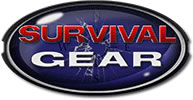Meeting Basic Needs During A Crisis
A survival emergency kit is just that, a kit designed to help you survive during an emergency. The emergency itself may take one of many different forms -- power outage, blizzard, solar flare, or terrorist attack for example. Since none of us can truly predict the future with certainty, a survival emergency kit should just concentrate on meeting the basic needs you'll have, regardless of the crisis.
Meeting Basic Needs During A Crisis
Every survival emergency kit should contain, at a minimum, a few days worth of food, a supply of water and the means to filter and purify more, a good first aid kit, some personal hygiene supplies, gear to keep you warm and sheltered from the elements, and the means to start a fire.
The food items in a survival emergency kit should be high in calories and require little or no preparation before eating. This is not the time to worry about keeping to a diet and watch your waistline. Calories are fuel for your body. Think along the lines of granola bars, protein bars, dried fruit, nuts, crackers, and pouched tuna. These all store fairly well for good lengths of time.
One or two water bottles will suffice as a start but be sure to include the means to filter and purify more water as you find it. These would be things like water purification tablets or a commercial water filter such as those sold by Aquamira. While these filtration systems are expensive, they will keep you from getting sick from drinking tainted water. Remember, just because the water is crystal clear doesn't mean it is clean.
A well-stocked first aid kit will serve well in keeping you reasonably healthy during an emergency. You'll want things to keep wounds from getting infected, so include adhesive bandages and antibiotic ointment. Burn cream is essential as well, since odds are good you'll be building campfires. Pain relievers will help you in dealing with not only injuries but with back and leg strain from walking more than you may be used to doing.
We invented toilet paper so we could stop using leaves. Pack some in your survival emergency kit, along with a small package of baby wipes. These two items alone will help you to feel human again. Hand sanitizer will be a tremendous asset in preventing illness and infection as well.
A rain poncho and an emergency blanket (sometimes called a space blanket) will help keep you sheltered from the elements. Being wet and cold can lead quickly to hypothermia. Paracord and a sharp knife can be used to construct many different kinds of expedient shelters. Don't forget items to help you get a fire started, such as butane lighters and strike anywhere matches. While there are certainly ways to get a fire burning using only the materials you find in the bush, having the forethought to pack these items will save you time and frustration. Some dryer lint or cotton balls soaked in petroleum jelly will get that fire going quickly.
While your survival emergency kit may look different than anyone else's, it should cover the basics to keep you alive until help has arrived.
